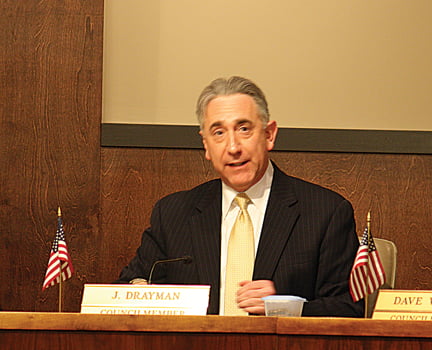
John Drayman, seen here when he was on the Glendale City Council, is due to begin trial in November.
By Mary O’KEEFE
On Friday, John Drayman, former Glendale city councilmember and former Montrose Shopping Park Association board member, was in court as lawyers proposed a plea agreement, but it was rejected by the judge.
In 2011, the MSPA accused Drayman of embezzling from its harvest market. The plea agreement, which had been accepted by both the district attorney and Drayman’s attorney, would have required Drayman to plead guilty to three felonies as well as other stipulations; however, Judge Stephen Marcus of the Los Angeles Superior Court rejected that agreement.
The case is now scheduled to go to trial with the next court appearance scheduled for Nov. 4 and the trial ordered to start within the following 16 days.
In court on Friday, Deputy District Attorney Susan Schwartz stated the agreed- upon requirements for the plea agreement, which included Drayman admitting his guilt of embezzlement of funds from the MSPA, tax fraud and perjury. He would also be restricted from running for any future public office and would be required to serve 300 hours of community service. There was no jail time in the agreement, which was a fact the judge did not feel was fair.
Judge Marcus referred to a probation report that stated Drayman was not eligible for probation. He asked Schwartz the feeling of those who made the charges, the 2011 MSPA board.
Schwartz presented a recent letter from former board members and current MSPA executive director Dale Dawson. In it, they agreed to the plea agreement stating it would be better for Montrose businesses not to have the publicity of a trial.
The letter, though, was not written by the present MSPA board.
“[The letter] was not authorized by the MSPA,” said Ken Grayson, board president. “No one on the current board knew anything about it.”
In 2012, Drayman was charged formally with 28 counts including embezzlement, filing false tax returns and money laundering. He is accused of embezzling an amount ranging from $304,000 to over $800,000 from the MSPA primarily from the harvest market.
The 2011 MSPA board members first levied the accusations. Alyce Russell was the board president at the time.
According to Drayman, the plea agreement was not something that was actively sought by him.
“I got a call from my lawyer asking if anyone had ever approached [me] with a settlement offer,” Drayman said in an interview with CVW after Friday’s court appearance.
Sean McDonald is the second public defender and third lawyer Drayman has had since the charges were brought. Drayman said none of his attorneys had approached him with a plea agreement. He told McDonald he was open to the possibility and after conferring with the district attorney his lawyer returned with an agreement.
“The [District Attorney’s Office] proposed of the 28 they will drop 25 counts,” he said. “I didn’t accept it right away. I had to think about it and talk to family and friends.”
In the end, he decided to take the plea agreement, which included admitting to guilt.
“I spoke to a lot of family and friends [about the plea]. I knew what the fall-out would be,” he said of the agreement. “But [a friend said] those who think you are the devil now will continue to think that, those who know you are innocent will continue to think you are and those who are on the fence may stay on the fence.”
The agreement had been discussed in court earlier in the week, on Tuesday, Sept. 24. According to Drayman, at that time Judge Marcus voiced his opinion that some jail time should be part of the agreement.
“No one had mentioned jail time in any agreement proposed to me,” Drayman said. “It was not part of the negotiation.”
Drayman said his lawyer later told him that the authors of the letter agreed with the plea agreement. Drayman said he was then told that on Friday it would be presented again to the judge.
It was then that Judge Marcus rejected the agreement.
All will be back in court on Nov. 4.
The one thing Drayman and his accusers have in common is they have voiced concern for what the publicity of the trial will do to Montrose. Although the judge was sensitive to the MSPA’s position of avoiding more unwanted publicity for fear it would hurt business, he did not see any way a plea agreement could be accepted without jail time.
“This is my principle position,” Marcus said. “I cannot give him no jail time.”
